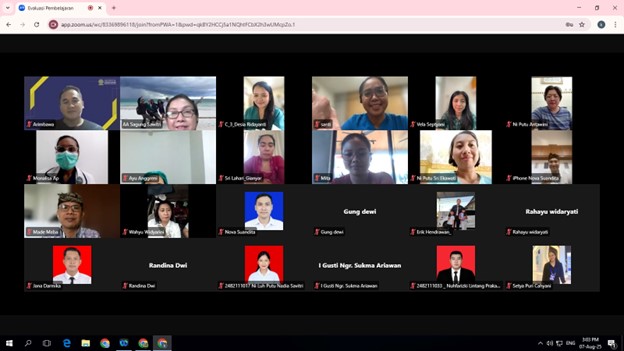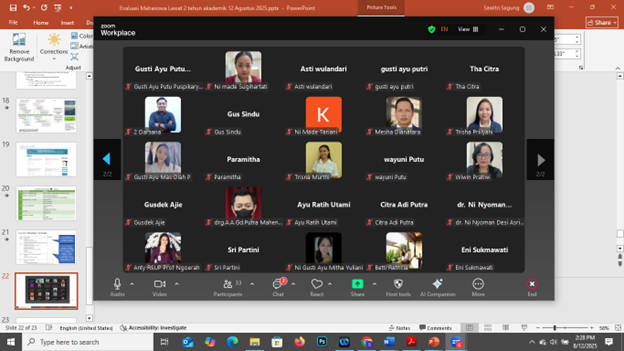Regular End-of-Semester Evaluation for the 2024 Cohort: Strengthening student–faculty dialogue, thesis readiness, and continuous quality improvement
To maintain learning quality and support student success, the Master of Public Health Program (Magister IKM) held its regular end-of-semester evaluation meeting online on August 7, 2025. The Head of Program, academic and administrative staff, and students from the 2024 cohort participated.
The session opened with a structured review of Semesters 1 and 2—covering course delivery, assessment practices, and any pending course completions. Students acknowledged that lecturer-assigned tasks helped deepen understanding, yet noted that the cumulative workload at times felt heavy and confusing. They requested a re-review of assignment volume, clearer guidance on procedures for retaking courses, and faster responses when rescheduling make-up classes. These points were addressed on the spot and immediately relayed to all teaching staff via the lecturers’ WhatsApp group for follow-up.
A second major segment focused on thesis management. The program walked students through the process end-to-end: refining a research problem, building a realistic timeline, and maintaining discipline across key stages—from proposal development and ethical clearance to data collection, analysis, manuscript preparation, and examination. Roles and lines of support were clarified, including the responsibilities of the program coordinator, administrative team, academic advisors, and supervising lecturers. Students were encouraged to maintain proactive, open communication with the program to prevent delays.
The Q&A was lively and detailed, centering on timeline planning, technical thesis management, ethical review processes and expected durations, TOEFL requirements prior to proposal defense, and the publication requirement for graduation—specifically whether manuscripts must align with thesis topics and what topic criteria are acceptable. All questions were addressed by the Head of Program and accompanying staff. The meeting ran for approximately 2.5 hours, after which the slide deck and meeting notes were distributed to lecturers through the WhatsApp teaching group.
This activity demonstrates the program’s commitment to student-centered learning and continuous quality improvement by systematically collecting and acting on student feedback. It also strengthens transparency in academic policies and procedures (e.g., course retakes, make-up sessions, thesis milestones, ethics timelines, language and publication requirements), clarifies supervisory and administrative support structures, and reinforces communication across stakeholders. Collectively, these efforts align with accreditation indicators on effective governance, academic guidance, learning resources and support, and graduate outcomes—particularly timely thesis completion and on-time graduation.



MEDICAL FACULTY